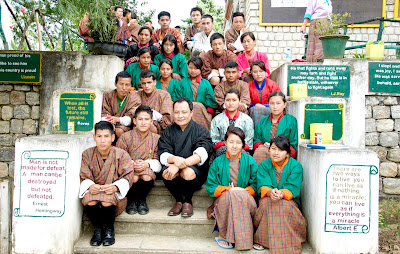A few days ago, I was in Thailand, a land fondly known to its people as
“The Land of Smile”. But quite surprisingly, this country of smile and joy was
undergoing the feeling of great loss, pain and collective numbness.
For their “Great Father”, their beloved King Bhumibol Adulyadej passed
away on 13th October 2016. Otherwise often associated with the
bright colors and busy life; however, on October 14 and 15 Thais were seen
predominantly dressed in black and they were mourning.
The people stood in front of shopping centers watching up at the big
digital screens that broadcasted the LIVE event of the King’s body being taken
from Siriraj Hospital in a motorcade to the Grand Palace. I could spot many
people openly weeping and wailing.
Workers and salespersons in the malls put on TV and were seen wiping
their tears with handkerchief. On the
streets, some people were bowing down in front of the portraits of the revered
King; as they offered prayers lighting incense sticks they cried.
The Thais mourned the loss as if like they had lost their own father.
That’s the love of the people of Thailand for their King. That’s the reverence
and submission to their “Great Father” despite the political division that
occurred in the past few decades of his reign.
“The news of his death cut deep into my heart like a knife. I am
heartbroken. I feel lost,” a man was quoted in a local English newspaper.
Indeed, all this touched me, deep inside my heart. And I couldn’t stop
myself from crying too. So I offered my prayers and good wishes whenever I
spotted the King’s portraits in Thailand.
For Thais, his was a life of sacrifice. He devoted himself to the
development of the country and hardly had any fun-filled life during his reign
of 70 years. Preaching perseverance and tolerance, he had no luxurious home
entertainment where he had lived.
Believed to be the leader with very high moral authority and wise
leadership, he had visited the remotest villages and brought them much-need
helps by constructing anti-flood schemes, agricultural projects, water
reservoirs and modern development.
In the past, many people had challenged the King’s ideologies and
institution. In the early morning of October 14, 1976, the King allowed
pro-democracy students fleeing a violent army crackdown to refuge in his palace
and made a call for them.
 |
| The most popular picture of the King among the Thais |
But mostly importantly, he was known for his outstanding ability of
unifying the people of Thailand. That’s why he was called as “Father of the
nation” and the unifying figure. There have been a few great leaders in the
world throughout the history but His Majesty King Bhumibol of Thailand ranks
among the highest.
A professor of Thailand, Rapee Sagarik wrote a heart-wrenching elegy on
a newspaper,
Bow to thee, my dearest king
Now my heart is not with me
For thee, I would do anything
Thinking of the past
I cry blood, not tears
It cuts deep inside
Unexpected loss, oh y dear king
Missing you, all musical
instruments are bleeding
The memory of thee will
Never be forgotten
The sudden death of the King brought a great feeling of loss and pain
to his citizens. Thailand has planned to observe 100 days of official
ceremonies and religious rites. The government declared one year of official
mourning and asked Thais to wear black and avoid festivities for 30 days.
Access to entertainment, including restaurants, bars, nightlife and shopping
areas will be restricted.
The business centers, industries and individual households were
mourning the loss by displaying their messages on big billboards and banners. Huge
grieving crowds gathered at the Siriraj Hospital holding yellow flags the
King’s portraits to bid a final farewell to their King as the King’s body was
taken to the Grand Palace.
Thai social media have been at their busiest ever. People freely shared
their feelings and memories and video clips, songs and pictures related to the
King’s life. A lot of thais shared Facebook posts of our Druk Gyalpo the Fifth
King who led his people in prayers for the late King.
Some distributed free foods and water to all those who came for the
procession during the day. Some people walked from long distances (more than 10
hours) to reach the hospital. They did all this to demonstrate their respect
and tribute to the King.
The editorial of “The Nation”, a national newspaper wrote,
“His Majesty’s life-long wish to see his nation prosper in the proper,
sustainable way and united in a non-harming, non-aggressive and non-violent way
must be pursued. The monarch always carried this great hope for this land, and,
on Thursday, he passed the torch to all of us.”
May Your Majesty’s Soul rest in peace!
Note: Anyone visiting
Thailand, I request you all to be respectful of Thais’ feelings and sensitivity
and if you care please wear black dress.
Always be cautious and look for public order laws.
Courtesy: Many and pictures
information extracted from The Nation.










